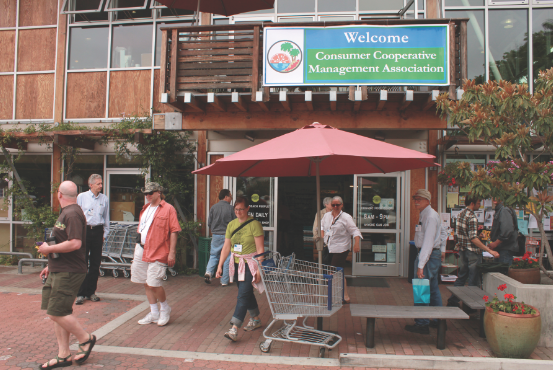Catching the Co-op Wave in San Diego

High spirits and stimulating conversations marked the 55th annual Consumer Cooperative Management Association (CCMA) conference in San Diego June 16–18. Attendees included over 400 food co-op managers and directors, along with educators and allies representing a record 112 cooperatives and organizations in two countries and 35 states from Alaska to Florida and California to Maine.
Attendance by food co-op board members was high, and many co-ops sent several directors. Participants of age 30 and younger, while a minority, were more numerous than ever and were an encouraging presence—in many cases representing one of the many food co-op startups in the country. (See “Co-op Milestones,” p. 4.)
This year’s theme was “Surf’s Up: Catch the Co-op Wave,” and the local host was Ocean Beach People’s Organic Food Co-op, whose staff and volunteers, led by General Manager Nancy Casady, contributed a great deal to hosting the conference and special events. First-day tour buses took visitors to Ocean Beach Co-op’s thriving store and to local cultural and political landmarks.
A very full conference program included two days of speakers and 40 workshops focused on co-op member linkage, growth and expansion, management strategies, board of directors training, innovative food projects, and startup challenges. The program was an outstanding offering of resources and presenters, addressing needs in operations and governance and large social issues, while providing flexibility and strong content for co-op veterans as well as newcomers.
CCMA conference planning is headed by Ann Hoyt, professor of consumer science at the University of Wisconsin and director of the UW Urban Cooperative Initiative. Additional support comes from university staff, co-ops in the host city, and co-op trainers, managers, and directors. The conference was also aided by a more robust CCMA.coop website and social networking participation on Facebook and Twitter.
CCMA is sponsored by the National Cooperative Business Association (NCBA), a membership organization representing over 20,000 cooperatives. The CEO of NCBA, Paul Hazen, and its vice president for public affairs and member services, Adam Schwartz, reminded the crowd of the vital national and international activities led by NCBA, especially preparations for 2012, declared by the United Nations as “The International Year of Cooperatives.” These businesses have unprecedented opportunities to promote understanding of the cooperative way of structuring ownership and serving communities.
A national affiliate organization, the Cooperative Development Foundation (CDF), manages projects including the Howard Bowers Fund, which offers scholarships for food co-op training and development. Many CCMA conference attendees first made it there through support from the Bowers Fund. This year’s fundraising efforts—including a reception at Bill and Michelle Lerach’s La Jolla mansion, an Air Guitar party, the annual silent auction of co-op swag and collectibles, and a public bidding for one year of displaying a large quilt made from co-op T-shirts—totaled nearly $45,000. In addition, food co-ops have been leading contributors to disaster relief funds managed by CDF, with assistance in 2011 going to cooperatives in Alabama and Japan.
Keynote speaker Mari Gallagher summarized her firm’s research on food deserts and poor public health. Gallagher reviewed innovative programs in Chicago and elsewhere that are helping residents in food deserts access quality food, and she challenged food co-ops to stretch their mission, to expand their imaginations and approaches to these challenging issues. Specific opportunities mentioned include expanding farmers markets and SNAP (food stamp) and WIC sales, food kiosks in other stores, and mobile sales scenarios.
A different kind of food desert was described in a brief presentation to the annual meeting of the Cooperative Grocers’ Information Network (CGIN). Jonathan Reinbold, a local sustainable-farming activist, described dramatic changes in San Diego County’s farm economy over the past 60 years. Although there are a large number of very small farms, land formerly used for grazing and food production has been given over almost entirely to nursery operations and sod grown for lawns and sprawling housing developments, with only 10 percent of local “agriculture” actually producing food. Included among the food producers is the Wild Willow Farm and Education Center, which has Ocean Beach People’s Organic Food Co-op as a sponsor (see CG #154, May–June 2011).
Brett Fairbairn, a co-op scholar and provost at the University of Saskatchewan, returned to CCMA and gave well-received remarks both in small group sessions and in a keynote presentation, “Keepin’ It Real: Co-ops in Turbulent Times.” Fairbairn reviewed the current economic turmoil and trends in globalization and sketched cooperative issues from a very informed and sympathetic perspective.
Fairbairn challenged cooperators to embrace uncertainty and strengthen use of our imagination. Evolution is necessary and is characterized, he emphasized, by variation with mixed reproductive success. In Fairbairn’s view, we need to engage in unconventional conversations, learn from outsiders, and think of governance as inclusive of additional stakeholders.
Present and unfolding economic circumstances are very supportive of the cooperative way of doing business. The CCMA conference in San Diego reminded us of these opportunities and that The International Year of Cooperatives can’t come any too soon. ■







